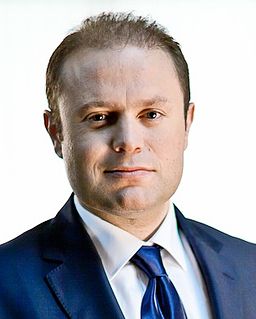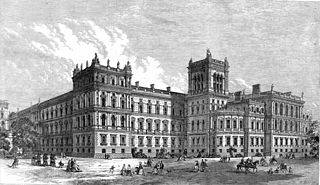
The European Parliament (EP) is the only parliamentary institution of the European Union (EU) that is directly elected by EU citizens aged 18 or older. Together with the Council of the European Union, which should not be confused with the European Council and the Council of Europe, it exercises the legislative function of the EU. The Parliament is composed of 751 members (MEPs), that will become 705 starting from the 2019–2024 legislature, who represent the second-largest democratic electorate in the world and the largest trans-national democratic electorate in the world.

The politics of Malta takes place within a framework of a parliamentary representative democratic republic, whereby the President of Malta is the constitutional head of state. Executive Authority is vested in the President of Malta with the general direction and control of the Government of Malta remaining with the Prime Minister of Malta who is the head of government and the cabinet. Legislative power is vested in the Parliament of Malta which consists of the President of Malta and the unicameral House of Representatives of Malta with the Speaker presiding officer of the legislative body. Judicial power remains with the Chief Justice and the Judiciary of Malta. Since Independence, the party electoral system has been dominated by the Christian democratic Nationalist Party and the social democratic Labour Party.

The President of the European Commission is the head of the European Commission, the executive branch of the European Union. The President of the Commission leads a cabinet of Commissioners, referred to as the college, collectively accountable to the European Parliament. The President is empowered to allocate portfolios amongst, reshuffle or dismiss Commissioners as necessary. The college directs the Commission's civil service, sets the policy agenda and determines the legislative proposals it produces.

Malta has a long history and was first inhabited in around 5900 BC. The first inhabitants were farmers, and their agricultural methods degraded the soil until the islands became uninhabitable. The islands were repopulated in around 3850 BC by a civilization which at its peak built the Megalithic Temples, which today are among the oldest surviving buildings in the world. Their civilization collapsed in around 2350 BC, but the islands were repopulated by Bronze Age warriors soon afterwards.

The National Assembly for Wales is the devolved parliament of Wales, with power to make legislation, vary taxes and scrutinise the Welsh Government. The Assembly comprises 60 members, who are known as Assembly Members, or AMs. Since 2011, Members are elected for five-year terms under an additional members system, in which 40 AMs represent geographical constituencies elected by the plurality system, and 20 AMs represent five electoral regions using the d'Hondt method of proportional representation. Typically the largest party in the Assembly forms the Welsh Government.

Charles Leslie Falconer, Baron Falconer of Thoroton, PC, QC, is a British Labour peer and barrister.

A Member of the European Parliament (MEP), also called a Eurodeputy is a person who has been elected to serve as a popular representative in the European Parliament.

Michael Kevin Moore is a British Liberal Democrat politician.

The Scottish devolution referendum of 1997 was a pre-legislative referendum held in Scotland on 11 September 1997 over whether there was support for the creation of a Scottish Parliament with devolved powers, and whether the Parliament should have tax-varying powers. The result was "Yes–Yes": a majority voted in favour of both proposals, and the Parliament was established following an election in 1999. Turnout for the referendum was 60.4%.

Timothy John Robert Kirkhope, Baron Kirkhope of Harrogate is a British lawyer and politician, previously serving as Member of the European Parliament for Yorkshire and the Humber for the Conservative Party. After serving for ten years as Member of Parliament for Leeds North East, he was first elected to the European Parliament in 1999. Between December 2004 and November 2010 he was leader of the Conservative delegation for a total of 6 years. He was the Chairman of the Conservative Friends of Israel's Europe grouping, the European Conservatives Spokesman on Justice and Home Affairs, and a member of the European Parliament's U.S Delegation. He holds a pilot's licence, collects classic cars, swims and plays tennis. He is married and has 4 grown up sons. He lives near Harrogate in North Yorkshire. In 2016, he was created a life peer.

Malta elects on a national level 6 MEPs representing Malta in the European Parliament, on a district level the legislature, On a local level the Local Councils and on a community level the Administrative Committees.

Simon Busuttil, is a Maltese politician who was Leader of the Opposition within the Maltese Parliament. He also served as a Leader of the Leader of the Nationalist Party and a Member of the European Parliament for the Malta constituency.

Certain governments in the United Kingdom have, for more than a century, attempted to find a way to reform the House of Lords, the upper house of the Parliament of the United Kingdom. This process was started by the Parliament Act 1911 introduced by the then Liberal Government which stated:
...whereas it is intended to substitute for the House of Lords as it at present exists a Second Chamber constituted on a popular instead of hereditary basis, but such substitution cannot be immediately brought into operation

Tonio Borg is a Maltese politician who was the European Commissioner for Health and Consumer Policy replacing John Dalli as member of the College of the European Commission in the second Barroso Commission. Borg is a conservative and a Roman Catholic.

Between 1973 and 1993 the European Communities saw the first enlargement of the Communities and increasing integration under the Delors Commission leading to the creation of the European Union in 1993.

General elections were held in Malta on Saturday, 9 March 2013. The Labour Party won a majority of seats thus defeating the Nationalist Party, which had been in power since 1987, save a short period of less than two years between 1996 and 1998 when Labour was in government.

The Treaty of Lisbon is an international agreement that amends the two treaties which form the constitutional basis of the European Union (EU). The Treaty of Lisbon was signed by the EU member states on 13 December 2007, and entered into force on 1 December 2009. It amends the Maastricht Treaty (1992), known in updated form as the Treaty on European Union (2007) or TEU, and the Treaty of Rome (1957), known in updated form as the Treaty on the Functioning of the European Union (2007) or TFEU. It also amends the attached treaty protocols as well as the Treaty establishing the European Atomic Energy Community (EURATOM).

Carmelo Abela is a Maltese politician and is serving as an incumbent Labour MP and was the Minister for Home Affairs and National Security. He also served as the Deputy Speaker of the House of Representatives of Malta. On June 8, 2017, he was appointed Minister for Foreign Affairs and Trade Promotion.

The Crown Colony of the Island of Malta and its Dependencies was a British colony in the present-day Republic of Malta. It was established when the Malta Protectorate was transformed into a British Crown colony in 1813, and this was confirmed by the Treaty of Paris in 1814.
The Māori loan affair of 1986 and 1987 in New Zealand was an unauthorised attempt by the Department of Māori Affairs (today called Te Puni Kōkiri) to raise money overseas for Māori development. The affair was first raised in Parliament on 16 December 1986 with a question from opposition National MP Winston Peters about loan negotiations; the revelations dumbfounded ministers; and the House adjourned on 18 December. Peters was reluctant to share all his information with Roderick Deane or his National Party leader Jim Bolger, and Bolger then downplayed the affair. Peters was getting information from an informant in Wetere’s office and from Rotorua businessman Rocky Cribb. Peters was first advised of the affair by Edwin Perry an associate of Cribb and like Cribb a National Party member. The affair helped Peters' promotion to the frontbench after the 1987 election.





















